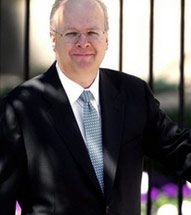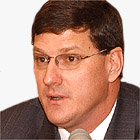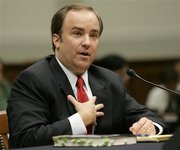 |
Former Bush Deputy White House Chief of Staff Karl Rove has a new president urging Congress not to force him to testify next week.
President Barack Obama.
In a court brief quietly filed Monday, Michael Hertz, Obama’s acting assistant attorney general, said it was necessary to delay an effort to force Rove to be deposed in a congressional investigation into the firing of nine US Attorneys and the alleged political prosecution of a former Alabama governor.
Hertz said an effort was underway to find a “compromise” for Rove, and requested two weeks to broker a deal before proceeding in court.
“The inauguration of a new president has altered the dynamics of this case and created new opportunities for compromise rather than litigation,” Hertz wrote in the brief released late Monday by McClatchy’s Washington, D.C. bureau. “At the same time, there is now an additional interested party – the former president – whose views should be considered.”
The House Judiciary Committee sued the Bush Administration to force Rove to testify last year, saying that Rove shouldn’t be covered by executive privilege. They won. But their case has been held up by an appeal, and Hertz’s filing was the Obama administration’s first legal weighing-in on the matter. Obama’s Justice Department has supplanted the role of Bush’s Justice Department in the case, and their position will likely inform the terms under which Rove is questioned by Congress.
Hertz’s statement mirrors a statement from Obama White House Counsel Gregory Craig published Saturday.
“The president is very sympathetic to those who want to find out what happened,” Craig told The Washington Post. “But he is also mindful as president of the United States not to do anything that would undermine or weaken the institution of the presidency. So, for that reason, he is urging both sides of this to settle.”
Both Hertz’s and Craig’s statement point to an underlying challenge Obama faces with regard to Rove. Since former President Bush still claims that Rove is protected from testifying to Congress by executive privilege, even after departing office, Obama must decide whether he wants to risk diluting his own executive privilege in the future.
These statements, however, stand in contrast to Obama’s previous rhetoric.
In 2007, while in the Senate, Obama rebuked Bush’s White House as “the most secretive in modern history,” which aimed “to hide its abuse of our justice system.”
Responding to a Bush claim of executive privilege, he said, “By continuing to act as the most secretive White House in modern history, the Bush Administration has once again placed itself above the law in order to hide its abuse of our justice system from the American people. On the first day of an Obama Administration, we will launch the most sweeping ethics reform in history to shed sunlight on the decisions made by government and put the interests of the American people at the center of every decision that’s made.”
House Judiciary Chairman John Conyers, Jr. (D-MI), who subpoenaed Rove as recently as last week and demanded that he come before Congress Feb. 23, refused a request from Rove’s attorney seeking a delay. Rove didn’t show up on two previous occasions he was subpoenaed, once in 2008 and again in January. He didn’t honor a 2007 Senate Judiciary Committee subpoena either.
Read moreObama, not Bush, now seeking delay of Rove deposition



